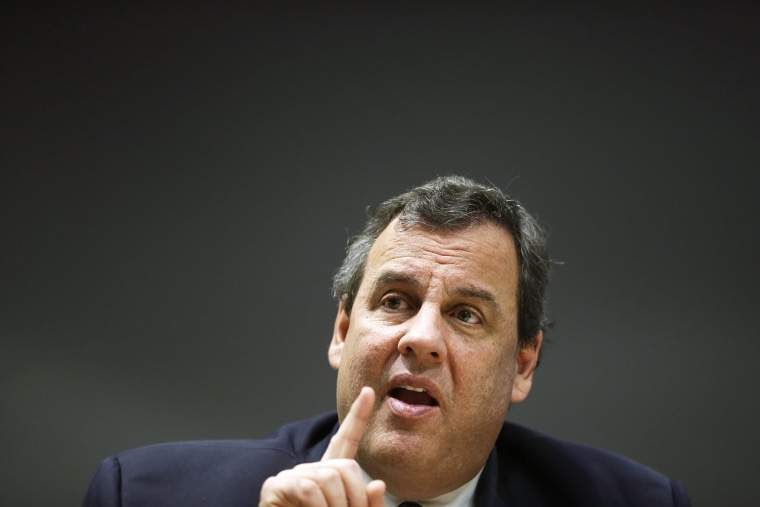When governors run for president, there's generally an expectation that foreign policy and national security won't be at the center of their campaign pitch. Sure, some governors will emphasize their role as the head of their state's national guard, or perhaps point to a foreign trade mission or two, but in nearly every instance, the nature of a governor's responsibilities focus their attention away from international affairs.
New Jersey Gov. Chris Christie (R), however, thinks he can break new ground -- by emphasizing the job he had shortly before he was elected. The
New York Times reported over the weekend:
As a presidential candidate, Gov. Chris Christie has sought to differentiate himself by spotlighting his tenure as the United States attorney for New Jersey, framing it as a time when he spent his "life protecting our country" against terrorism. [...] Mr. Christie, in an interview on Wednesday, stood by his characterization of his accomplishments as prosecutor, and denied using any dramatic license when speaking about his record. "I have been exposed to both information and agencies that these other folks just haven't been exposed to," he said, referring to the other presidential candidates.
It's a nice pitch, isn't it? Christie is billing himself as offering the best of both worlds: he has leadership experience as a chief executive of a large state and he has national-security experience -- in his words, "protecting our country" -- from his tenure as a federal prosecutor. It's the kind of resume few in the 2016 can match.
It's also not entirely true.
The
Washington Post fact-checked Christie's boasts and
found that the New Jersey Republican tends to characterize his legal background in different ways, depending on what helps his political ambitions at the time. When Christie ran for governor, he said his focus as a U.S. Attorney was on battling corruption. Now that he's running for president, those same years
have been repackaged to make it seem as if Christie is a counter-terrorism hero.
...Christie's recent remarks on his counterterrorism experience are also prompting backlash, particularly among supporters of his political rivals, who note that Christie was much better known for battling public corruption than for fighting terrorism when he was a U.S. attorney. "His newfound war on terror?" said Rick Shaftan, a New Jersey Republican political strategist who is supporting one of Christie's rivals, Sen. Ted Cruz (Tex.). "His whole thing was corruption. That was his claim to fame, not terror."
Christie, a
Post piece added, "goes too far saying he spent his 'life' focused on anti-terrorism cases."
The
Times piece added that Christie has, on more than one occasion, "overstated the significance of the terrorism prosecutions he oversaw ... and appears to have exaggerated his personal role in obtaining court permission for surveillance of terrorism suspects."
At the first Republican debate in August, Mr. Christie called himself "the only person on this stage who's actually filed applications under the Patriot Act, who has gone before the Foreign Intelligence Service Court." Similarly, his campaign website says "Christie's office" secured authorization from that court, which is actually called the Foreign Intelligence Surveillance Court, for the surveillance of terrorism suspects. While the court, which is also known as the FISA court, did approve national security wiretaps in New Jersey on Mr. Christie's watch, neither he nor his office secured them. Only the Office of Intelligence at the Justice Department's headquarters drafts and submits applications for surveillance and then litigates them before the court. Mr. Christie's campaign website credits his office with obtaining an indictment against the kidnapper of the Wall Street Journal reporter Daniel Pearl, who was abducted and killed in Pakistan, and notes that the defendant, Ahmed Omar Sheikh, was "sentenced to death." It does not mention a key fact: The trial took place in Pakistan. Mr. Christie's office had no role in it.
It is true that Christie, like many U.S. Attorneys who were in office soon after 9/11, devoted time and resources to counter-terrorism. It's also true that every presidential candidate looks for opportunities to accentuate their resumes in politically beneficial ways.
But the governor's boasts strain credulity. At a recent debate, Christie bragged, "Radical jihadist terrorism is not theoretical to me. It's real. And for seven years, I spent my life protecting our country against another one of those attacks." It's nice rhetoric, but reality paints a very different picture.
